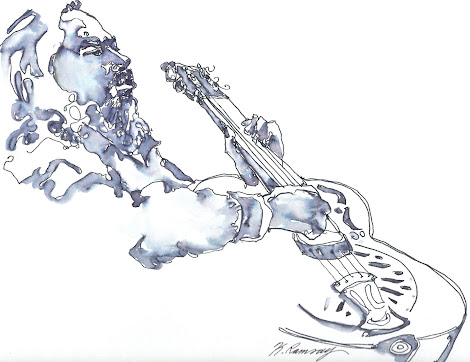Last month, Kurt Andersen and Studio 360 had a feature of The Top 10 Songs We Never Want to Hear Again. This wasn't an attack on crappy music, but rather a take on decent songs that have been played so often that it's torture to hear them yet again. Songs like Pachelbel's Canon in D Major and Hotel California by the Eagles were there. Surprisingly, my own top picks of Lynyrd Skynyrd's Freebird or Derek and the Dominos' Layla were missing.
But what about the other side of that coin? What are the songs that should trigger an allergic response but still manage to get under our skins every single time? These songs get played constantly but still haven't worn out their welcome.
Here are my top five:
1) So What - Miles Davis
Just about every track on Kind of Blue is a classic. So What opens the album and is a special treat. Every time I play it, I'm struck by the absolute perfection of the phrasing. The slow build repeating the theme sets up my anticipation for the first solo. Davis starts in a conversational tone and then develops his initial ideas. The hand off to Coltrane is so natural; it's a blend of ballet and engineering.
Even the covers, like Eddie Jefferson's vocalese version, find plenty of rich ground to mine. The balanced arrangement and the inevitable flow make other jazz tracks like Dave Brubeck's Take Five seem clunky in comparison.
2) Willin' - Little Feat
Every folk jam I've joined seems to include Willin' and The Weight by The Band. Maybe it's because of the descending bassline (I'm a sucker for a descending bassline), but despite the hundreds of times I've played it and heard it, the warm steel guitar and sweet harmonies still touch an emotional truth for me. Unlike the free form narrative of The Weight, Little Feat's character study creates a clearer image. The harmonies on the chorus are pure and the lyrics hint at a host of stories.
3) The Revolution Will Not Be Televised - Gil Scott-Heron
This song has become a cultural touchstone. Sampled and referenced by countless artists, Gil Scott-Heron's track serves as a proto-rap jam. Unlike bands like The Last Poets, Scott-Heron showed up on mainstream radar. There's magic in the contrast between the uncompromising spoken word message and its wicked jazz funk accompaniment. Maybe Hubert Laws' meandering flute and Ron Carter's funked out bassline opened a path for the song's message. In any case, Scott-Heron's lyrical flow and running riff of cultural allusions never gets old.
4) My Generation - The Who
The Who managed to milk this song for several generations of young fans. A party anthem in the mid-'60s, countless collections of fresh teens have connected with the track leading to a host of covers. It was less ironic than cynical when the band trotted it out again during their various farewell tours ('82, '89, '99, etc).
But the raw energy of the track presages punk rock and Roger Daltrey's stutter presents a universal sense of inarticulate youth. Pete Townshend tapped into the collective unconsciousness and captured the archetype of teen rebellion. Regardless of a regular place on the classic rock station playlists, its message remains meaningful and I still love to hear it.
5) Interstellar Overdrive - Pink Floyd
This one is a little more obscure. It came up again recently in this month's iPod shuffle reviews. Interstellar Overdrive was probably one of my first exposures to free style jam music. Maybe it's the fond memories I associate with it, but I still find interesting little nuances when I hear it again. I cannot guess the number of times I've listened to this track. If it's been overplayed, I have only myself to blame.
But compared to the the sea of self indulgent jam band songs, Interstellar Overdrive creates a robust structure that allows for rich musical complexity.
Which songs have found a place in your heart, where repetition is just another satisfying encounter? Drop me a note in the comments.

No comments:
Post a Comment